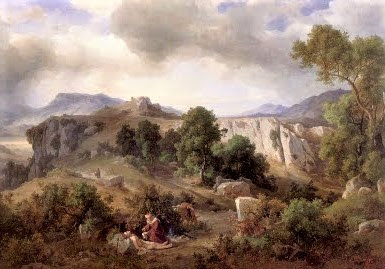St. Bonaventure, known as "the seraphic doctor," was born in the Lazio region of central Italy in 1221. His baptismal name was John. He received the name of Bonaventure because of an exclamation which was made by St. Francis of Assisi, when little John’s mother took him to Francis, begging him to pray for her little boy who was very ill. Francis prayed, and little John recovered. When Francis foresaw the future greatness of the boy, he cried out "O buona ventura" - O good fortune! – and that was the name given to John when he entered the Franciscan order.
He was twenty-two when St. Bonaventure joined the Franciscans. Having made his vows, he was then sent to Paris to complete his studies. His main tutor was the celebrated doctor Alexander of Hales, who was an Englishman and a Franciscan. While he was in Paris, St. Bonaventure became a close friend of the great St. Thomas Aquinas. They received their doctoral degrees together, but St. Bonaventure, always a very humble man, insisted that at the ceremony Thomas Aquinas should have the honour of receiving it first. Both St. Thomas Aquinas and St. Bonaventure became well known throughout the Church for their great scholarship and brilliance, and both even became quite close to the holy king of France, St. Louis.
At the age of thirty-five St. Bonaventure was chosen to be the General of the Franciscan Order. It was a difficult time for the Franciscans, because of internal dissension. The friars had argued about the meaning and practice of poverty. Already they were straying from the vision and teaching of their Founder, but St. Bonaventure restored peace to the Order. He worked tirelessly for the Franciscan Order, and composed an important work, The Life of St. Francis. He was nominated Archbishop of York in England by Pope Clement IV, but he begged the pope not to force him to accept. The next pope, Gregory X, obliged Bonaventure to take upon himself an even more difficult position, that of the Cardinal Archbishop of Albano, one of the six suffragan Sees of Rome, while still being General of his Order. However, before his death he resigned his office of General of the Franciscan Order. He died while he was at the Second Council of Lyons, on July 15, 1274, working for the good of the Church until his very last breath. How right St. Francis was when he exclaimed “O buona ventura” – “O good fortune!” It was certainly good fortune for the Church when St. Bonaventure gave his life in service to Christ.
It was said of St. Bonaventure (1221-1274) that he was "...a unique personality. He was unsurpassed in sanctity, wisdom, eloquence, and gifted with a remarkable skill of accomplishing things, a heart full of love, a winning disposition, benevolent, affable, pious, charitable, rich in virtue, beloved by God and man. . . . The Lord endowed him with such a charming disposition that everyone who saw him was immediately attracted to him."
Considered to be a "second founder" of the Franciscans, he was an outstanding teacher and a spell-binding preacher. He was known for his virtue and wisdom. He is known as the "Seraphic Teacher" because of his deeply mystical understanding of the Faith.
______________________________
O God, by whose providence blessed Bonaventure was sent to guide thy people in the way of everlasting salvation: grant, we beseech thee; that as we have learned of him the doctrine of life on earth, so we may be found worthy to have him for our advocate in heaven; through Jesus Christ thy Son our Lord, who liveth and reigneth with thee, in the unity of the Holy Spirit, ever one God, world without end. Amen.
Prayer of St. Bonaventure.
Pierce, O most sweet Lord Jesus, my inmost soul with the most joyous and healthful wound of Thy love, and with true, calm and most holy apostolic charity, that my soul may ever languish and melt with entire love and longing for Thee, may yearn for Thee and for thy courts, may long to be dissolved and to be with Thee.
Grant that my soul may hunger after Thee, the Bread of Angels, the refreshment of holy souls, our daily and super substantial bread, having all sweetness and savor and every delightful taste.
May my heart ever hunger after and feed upon Thee, Whom the angels desire to look upon, and may my inmost soul be filled with the sweetness of Thy savor; may it ever thirst for Thee, the fountain of life, the fountain of wisdom and knowledge, the fountain of eternal light, the torrent of pleasure, the fullness of the house of God; may it ever compass Thee, seek Thee, find Thee, run to Thee, come up to Thee, meditate on Thee, speak of Thee, and do all for the praise and glory of Thy name, with humility and discretion, with love and delight, with ease and affection, with perseverance to the end; and be Thou alone ever my hope, my entire confidence, my riches, my delight, my pleasure, my joy, my rest and tranquility, my peace, my sweetness, my food, my refreshment, my refuge, my help, my wisdom, my portion, my possession, my treasure; in Whom may my mind and my heart be ever fixed and firm and rooted immovably. Amen.
______________________________
Painting: "St. Bonaventure holding the Tree of the Redemption"
by Vittorio Crivelli, born ca. 1440, died ca. 1502
















